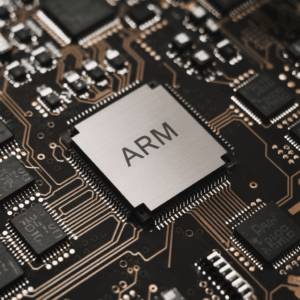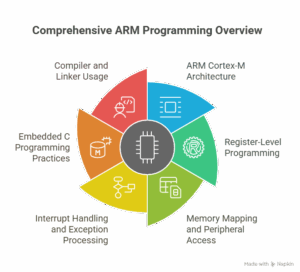
Arduino Robotics Course: Build Skills for a Career in Automation and Embedded Systems
June 14, 2025
Raspberry Pi Certification Course – A Curriculum Built for Real-World Learning
June 17, 2025In today’s rapidly evolving technology landscape, embedded systems have become integral to nearly every electronic device we interact with. From smartphones and wearables to advanced industrial machines, embedded systems are the silent engines powering modern innovation. At the core of many of these embedded systems is the ARM microcontroller, a compact and efficient computing unit that enables precise control, low power consumption, and scalable performance.
If you are an engineering student, a tech enthusiast, or a professional seeking to enter the embedded domain, enrolling in an ARM microcontroller course can provide you with the knowledge, skills, and confidence to design real-world systems. This comprehensive blog will explore the essentials of ARM microcontroller training, course content, career pathways, and how Embedded School offers a holistic learning experience to prepare you for a thriving career in embedded systems.
Table of Contents
Understanding ARM Microcontrollers
ARM stands for Advanced RISC Machine, and it represents a family of reduced instruction set computing (RISC) architectures that are widely adopted across industries. ARM microcontrollers are known for their simplicity, low energy usage, and high-speed performance. The Cortex-M series of ARM processors, such as Cortex-M0, M3, and M4, are particularly popular in embedded systems due to their optimal blend of performance and efficiency.
ARM microcontrollers are used in a wide array of applications including automotive systems, medical devices, industrial automation, robotics, consumer electronics, and Internet of Things (IoT) products. Their widespread adoption has created a growing demand for engineers proficient in ARM programming and embedded development.
Why Choose an ARM Microcontroller Course
In today’s technology-driven world, embedded systems are the backbone of countless applications—from consumer electronics and automotive systems to industrial automation and IoT devices. Among the many platforms available, ARM microcontrollers stand out as a powerful and flexible choice widely adopted by industries worldwide.
An ARM Microcontroller Course provides a well-rounded, skill-intensive education designed to meet the increasing demand for embedded systems professionals. Whether you’re a student, electronics enthusiast, or working professional, enrolling in this course offers a fast-track to mastering the essential tools and technologies of the embedded world.
What Makes ARM Microcontroller Training a Smart Choice?
This course is not just about theory; it’s a practical, project-oriented, and industry-focused program that offers hands-on experience with tools, kits, and programming environments used by professionals in real-world embedded systems development.
Key Benefits of Enrolling:
- In-Depth Understanding of ARM Architecture and Its Applications
Learn the core principles behind ARM Cortex-M processors, including their architecture, registers, instruction sets, and power-efficient design—critical for embedded and low-power applications. - Master Embedded C Programming Tailored to ARM
Develop robust programming skills specific to embedded systems using Embedded C, with a focus on writing efficient, hardware-level code that interacts with sensors, memory, and communication protocols. - Hands-On Experience with Industry-Standard Tools
Get trained on widely used tools such as Keil uVision IDE, STM32 development boards, and CMSIS libraries. These tools simulate real development environments and help you gain valuable debugging and hardware programming skills. - Build Real-Time Embedded Projects
Apply your knowledge by developing real-time projects such as sensor-based systems, control modules, communication interfaces, and mini-IoT applications—demonstrating your skills in a practical setting. - Enhance Your Resume and Career Prospects
Completing an ARM Microcontroller Course adds substantial weight to your profile. Whether you’re applying for internships or full-time positions, showcasing live projects and a solid grasp of embedded concepts makes you stand out to recruiters. - Learn at Your Level—Beginner to Advanced
Whether you’re new to microcontrollers or have prior experience, structured modules guide you from the fundamentals to advanced topics like interrupt handling, RTOS basics, and embedded debugging techniques.
ARM Processor Programming Basics
Programming ARM processors involves understanding the underlying architecture and writing efficient code that interfaces with hardware components. In an ARM microcontroller course, learners are introduced to key programming concepts including:
- ARM Cortex-M series architecture overview
- Register-level programming
- Memory mapping and peripheral access
- Interrupt handling and exception processing
- Embedded C programming practices
- Compiler and linker usage
These basics form the foundation for more advanced development, allowing students to write firmware that directly interacts with sensors, actuators, and communication interfaces.
Job-Oriented ARM Microcontroller Training
The goal of job-oriented ARM microcontroller training is to prepare students for immediate employment in the embedded systems industry. These programs focus on practical skills, industry tools, and current technologies used in real-world development environments.
Key features of job-oriented training include:
- Hands-on labs with STM32 or NXP LPC microcontrollers
- Real-time operating systems (RTOS) integration
- Debugging and simulation using professional IDEs
- Project-based learning with real-world applications
- Resume-building support and placement assistance
Such courses bridge the gap between academic knowledge and industry expectations, giving learners a competitive advantage in job markets.
ARM Microcontroller Course for Beginners
For those new to embedded systems, an ARM microcontroller course for beginners serves as an excellent starting point. These introductory courses typically cover:
- Basic electronics and microcontroller concepts
- Introduction to embedded systems and development tools
- ARM architecture and instruction set
- Simple programming exercises and hardware interfacing
Beginner-level courses are designed to build a strong foundation before progressing to complex concepts like RTOS, interrupt-driven programming, and advanced peripheral usage. With guided mentorship and structured content, even students without a background in electronics can grasp embedded development.
ARM Embedded Course Online
Flexibility in learning is a critical factor for many learners. Online ARM embedded courses provide the convenience of remote learning while maintaining the quality of instruction and hands-on experience. Reputed institutes like Embedded School offer online training modules that include:
- Video lectures and interactive tutorials
- Virtual labs and simulators
- Live sessions with industry experts
- Downloadable study materials and code examples
- Online assessments and feedback
With online access, learners from any location can acquire the skills necessary to work on embedded projects, without the need for physical classroom attendance.
Advanced Embedded Systems Using ARM
As learners progress, they are introduced to advanced embedded systems concepts using ARM microcontrollers. These include:
- Real-Time Operating System (RTOS) implementation
- Task scheduling, mutexes, semaphores, and inter-process communication
- Power management and low-power design techniques
- IoT protocols and cloud integration
- Data acquisition and control systems
Advanced training enables students to work on complex and high-performance embedded systems used in automotive ECUs, smart grid devices, medical equipment, and other mission-critical applications.
Career Opportunities in Embedded Systems
Completing an ARM microcontroller course opens doors to various career paths in the electronics and embedded industry. Job roles include:
- Embedded Software Engineer
- Firmware Developer
- IoT Application Developer
- Robotics Programmer
- Hardware Integration Specialist
- Automotive Embedded Engineer
Industries hiring embedded professionals include:
- Consumer electronics
- Automotive systems
- Healthcare devices
- Aerospace and defense
- Smart manufacturing and automation
With the growing demand for smart and connected devices, embedded systems professionals with ARM expertise are highly sought after.
Project-Based Learning
Project work is an essential component of embedded systems training. It helps reinforce theoretical knowledge through practical application and problem-solving. Sample projects in an ARM microcontroller course may include:
- Home automation system using ARM Cortex-M3
- Industrial temperature monitoring and control
- Gesture-controlled robotic arm
- Smart irrigation system with real-time feedback
- IoT-based environmental data logger
These projects not only enhance technical skills but also build confidence and readiness for job roles.
Why Choose Elysium Embedded School for ARM Microcontroller Training
Elysium Embedded School has established itself as a trusted and leading institution in the field of embedded systems education. With a strong reputation for academic excellence and industry collaboration, the school offers cutting-edge training programs tailored to meet real-world technological and employment demands.
Among its flagship programs, the ARM Microcontroller Course stands out as a comprehensive, skill-focused pathway designed to equip students with a deep understanding of embedded systems through both theoretical instruction and extensive hands-on experience.
Key Advantages of Learning at Elysium Embedded School:
Expert-Led Instruction with Industry Relevance
At Elysium Embedded School, learning is led by qualified professionals with extensive industry backgrounds. These instructors bring decades of real-world experience from the embedded systems and electronics sectors, enabling students to gain practical insights and exposure to current trends and tools used in the field.
Hands-On Training with Real-Time Project Implementation
Theory alone doesn’t make a professional. That’s why our training approach is deeply practical and application-oriented. Students engage in real-time projects, simulating real industrial scenarios—from ARM-based control systems to sensor integration and debugging workflows. These projects provide a sandbox for creativity and innovation, while building confidence and technical fluency.
Structured, Progressive Curriculum
The ARM Microcontroller Course at Elysium Embedded School is designed for progressive learning. The curriculum starts with the fundamentals of ARM architecture, Embedded C programming, and peripheral interfacing, and gradually advances into real-time operating systems (RTOS), protocol communication, and ARM-based system integration.
Topics include:
- ARM Cortex-M architecture and instruction set
- Keil µVision IDE and debugging tools
- GPIO, ADC, UART, I2C, SPI interfacing
- Embedded C and CMSIS libraries
- Real-time project modules using STM32 development boards
Career-Oriented Training with Placement Assistance
One of the core missions of Elysium Embedded School is to bridge the gap between education and employment. The course includes a strong focus on career development:
- Resume building and LinkedIn profile optimization
- Mock interviews and technical assessments
- Connections with top recruiters in embedded systems and IoT sectors
With tie-ups across the electronics, automation, and embedded product development industries, we offer strong placement assistance, preparing students to secure roles such as Embedded Developer, Firmware Engineer, Hardware Engineer, and more.
Flexible Learning Options to Suit Your Schedule
Recognizing the diverse needs of learners, Elysium Embedded School offers both online and offline course options. Whether you’re a full-time student, a working professional, or a career switcher, our flexible schedules, including evening and weekend batches, make it easy to learn at your own pace without compromising quality.
Updated Content to Keep Pace with Industry Evolution
The world of embedded systems is constantly evolving. Our curriculum is regularly revised by a panel of experts to include latest trends, emerging technologies, and industry feedback. This ensures you’re learning skills that are relevant, in demand, and applicable immediately in a professional setting.
State-of-the-Art Infrastructure and Learning Environment
Our labs are fully equipped with modern tools, including STM32 development boards, logic analyzers, oscilloscopes, and all necessary hardware kits. Combined with dedicated mentoring support, structured assessments, and access to recorded lectures, you receive a complete learning ecosystem.
Alumni Network and Continuous Learning Support
Becoming part of Elysium Embedded School means joining a growing community of alumni and professionals across the globe. We offer continued access to resources, webinars, and career guidance even after course completion, ensuring long-term value and growth support.
Certification and Placement Support
Completing an ARM microcontroller course at a recognized institution like Elysium Embedded School does more than just add a line to your resume—it marks a pivotal step in building a solid foundation for a career in embedded systems. Our certification is not just a formality; it is a well-earned credential that reflects your technical competence, practical proficiency, and industry-readiness.
Industry-Recognized Certification
At the successful completion of the ARM microcontroller course, students receive a certification issued by Elysium Embedded School, a name trusted in embedded education and professional upskilling. This certification serves as:
- A mark of credibility, verifying your knowledge in ARM architecture, embedded C programming, STM32 development, and debugging techniques.
- A professional asset that enhances your profile when applying for jobs, internships, or freelance technical roles.
- Proof of hands-on experience, particularly valuable when demonstrating project-based skills to potential employers during interviews.
Our certification is designed to be aligned with industry expectations, making it highly valuable to recruiters looking for candidates who are ready to contribute from day one.
Comprehensive Placement Support
Understanding that technical skills alone are not enough, Elysium Embedded School provides robust placement support to bridge the gap between education and employment. Our placement program is structured to offer holistic career development and support services that help learners confidently enter the job market.
Our Placement Services Include:
- Customized Resume Development
Our team works closely with students to create impactful, professional resumes that highlight their strengths, technical skills, and project experience. Special attention is given to emphasizing hands-on work, certifications, and tools proficiency like Keil uVision, STM32, and embedded C. - Mock Interviews and Technical Screening
We conduct regular mock interviews, both technical and HR-focused, to help students gain confidence and improve their interview performance. These sessions simulate real hiring processes and include feedback for improvement. - Soft Skills and Communication Training
Success in technical roles also depends on effective communication. We offer dedicated sessions to help students improve interpersonal skills, teamwork, and technical presentation abilities, ensuring they’re fully prepared for client and team interactions. - Job Referrals and Industry Linkages
Through our network of corporate partners and recruiters, students gain access to exclusive job opportunities in sectors like embedded product development, IoT, automotive systems, industrial automation, and consumer electronics. Our placement cell maintains ongoing relationships with hiring managers across the industry to facilitate timely referrals and job matches. - Career Mentorship and Counseling
Each student is offered personalized career guidance to help them understand different paths within embedded systems—whether it’s firmware development, hardware design, robotics, or IoT integration. This mentoring helps learners align their interests with high-growth roles in the field.
Frequently Asked Questions (FAQs)
- What is the course duration of the ARM microcontroller program at Elysium Embedded School?
The ARM microcontroller course at Elysium Embedded School typically spans from 6 weeks to 3 months, based on the selected course level and learning mode (online or in-person). - Does Elysium Embedded School require programming knowledge before enrollment?
No, Elysium Embedded School does not require prior programming knowledge. The beginner-level courses are designed to start from the fundamentals, making them suitable for newcomers. - What tools and development kits are provided by Elysium Embedded School during the training?
Elysium Embedded School equips students with industry-relevant tools such as the Keil uVision IDE, STM32 microcontroller boards, and hardware debugging kits to ensure hands-on practical experience. - Can I pursue an ARM microcontroller course at Elysium Embedded School while studying or working?
Yes, Elysium Embedded School offers flexible scheduling, including weekend and evening batches, making it convenient for students and working professionals to attend without disrupting their regular commitments. - Does Elysium Embedded School offer placement support after course completion?
Yes, Elysium Embedded School provides end-to-end placement support, including resume building, interview training, and direct assistance in securing job opportunities in the embedded systems industry.
Conclusion
Enrolling in an ARM microcontroller course is a strategic and rewarding step for anyone aspiring to build a successful career in the field of embedded systems. These courses offer a perfect blend of theoretical knowledge and practical experience, covering ARM processor programming basics, real-time system design, and hands-on project development.
The ARM microcontroller course is designed to benefit both beginners looking to enter the embedded domain and professionals seeking to enhance their technical expertise. With industry-relevant tools, live projects, and structured learning paths, learners gain the practical skills that employers actively seek.
At Elysium Embedded School, the ARM microcontroller course is delivered by experienced trainers with deep industry knowledge. The curriculum is continuously updated to reflect the latest advancements in embedded technology. Students benefit from flexible learning modes—including online and offline classes—alongside dedicated placement assistance, interview preparation, and resume-building support.
Choosing the ARM microcontroller course at Elysium Embedded School ensures not just education but empowerment—equipping you with the confidence and technical capability to solve real-world challenges in embedded systems.













